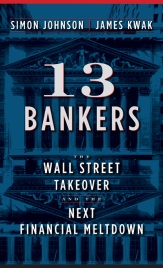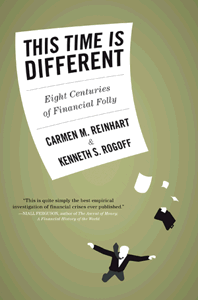With the previous post, Professor Galambos has kicked off this year’s LU Economics Summer Reading Fun, or something like that. Any student (or colleague, or alum) interested in reviewing a book related to economics or LU economics is welcome to submit a book review that we will post right here on the blog.
Here are some suggestions that I am very interested in learning about, but likely won’t read myself:
Brad DeLong and Stephen Cohen, The End of Influence: What Happens When Other Countries Have the Money?
 When you have the money–and “you” are a big, economically and culturally vital nation–you get more than just a higher standard of living for your citizens. You get power and influence, and a much-enhanced ability to act out. When the money drains out, you can maintain the edge in living standards of your citizens for a considerable time (as long as others are willing to hold your growing debts and pile interest payments on top). But you lose power, especially the power to ignore others, quite quickly–though, hopefully, in quiet, nonconfrontational ways. An you lose influence–the ability to have your wishes, ideas, and folkways willingly accepted, eagerly copied, and absorbed into daily life by others. As with good parenting, you hope that by the time this happens those ideas and ways have been so thoroughly integrated that they have become part of what is normal and regular abroad as well as at home; sometimes, of course, they don’t. In either case, the end is inevitable: you must become, recognize that you have become, and act like a normal country. For America, this will be a shock: American has not been a normal country for a long, long time.
When you have the money–and “you” are a big, economically and culturally vital nation–you get more than just a higher standard of living for your citizens. You get power and influence, and a much-enhanced ability to act out. When the money drains out, you can maintain the edge in living standards of your citizens for a considerable time (as long as others are willing to hold your growing debts and pile interest payments on top). But you lose power, especially the power to ignore others, quite quickly–though, hopefully, in quiet, nonconfrontational ways. An you lose influence–the ability to have your wishes, ideas, and folkways willingly accepted, eagerly copied, and absorbed into daily life by others. As with good parenting, you hope that by the time this happens those ideas and ways have been so thoroughly integrated that they have become part of what is normal and regular abroad as well as at home; sometimes, of course, they don’t. In either case, the end is inevitable: you must become, recognize that you have become, and act like a normal country. For America, this will be a shock: American has not been a normal country for a long, long time.
Simon Johnson & James Kwak, 13 Bankers: The Wall Street Takeover and the Next Financial Meltdown.
 Veterans of Econ 240 should recognize Johnson from “The Quiet Coup,”which made the case that the Wall St big boys call the shots with respect to financial regulation. Well, if you liked “The Quiet Coup,” then, well, I don’t know if you’ll love this or not because I haven’t read it. The authors recommend breaking up the banks into little bitty pieces.
Veterans of Econ 240 should recognize Johnson from “The Quiet Coup,”which made the case that the Wall St big boys call the shots with respect to financial regulation. Well, if you liked “The Quiet Coup,” then, well, I don’t know if you’ll love this or not because I haven’t read it. The authors recommend breaking up the banks into little bitty pieces.
Here’s the book’s website and Tyler Cowen reviews it here.
Carmen Reinhart and Kenneth Rogoff, This Time Is Different: Eight Centuries of Financial Folly (a paper version here and the Cliff’s Notes are here).
 Dedicated readers might recognize Rogoff from a post from a few days ago on the difficulties of regulating amidst rapid technological changes. He and Carmen Reinhart take a look at a few hundred years of data to explore the causes and consequences of financial crises and public defaults. In their own words, “technology has changed, the height of humans has changed, and fashions have changed. Yet the ability of governments and investors to delude themselves, giving rise to periodic bouts of euphoria that usually end in tears, seems to have remained a constant.”
Dedicated readers might recognize Rogoff from a post from a few days ago on the difficulties of regulating amidst rapid technological changes. He and Carmen Reinhart take a look at a few hundred years of data to explore the causes and consequences of financial crises and public defaults. In their own words, “technology has changed, the height of humans has changed, and fashions have changed. Yet the ability of governments and investors to delude themselves, giving rise to periodic bouts of euphoria that usually end in tears, seems to have remained a constant.”
Foreign Policy has a lengthy review.
I actually have a stack of recommendations that I will post after I get my grading done. Anyone interested in reviewing these or any other books of interest, just let me know.